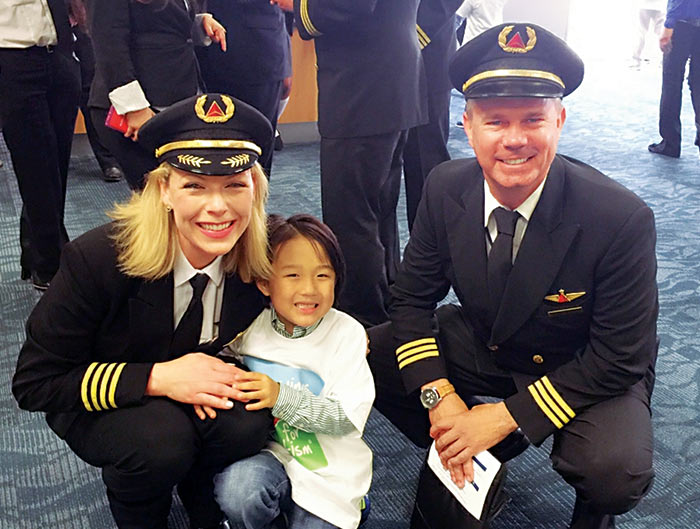Our Stories: Pilot Creates Global Support Network
Draws on Personal Challenges to Help Others
By John Perkinson, Senior Staff Writer

Capt. Andrea Ratfield (Delta) and F/O Erich Ries (Delta) volunteer at a Wings for Autism event in Atlanta, Ga.
Capt. Andrea Ratfield (Delta) recognizes the value of helping others. Having been on her own since the age of 16, she knows what it’s like to need help. Whether confronting life’s challenges or simply wanting someone to bounce ideas off of, being able to access a network of peers can be invaluable. That’s the reason she and several other women established Female Aviators Sticking Together (FAST), a global community of more than 7,700 women who fly in every segment of air transportation.
“FAST was created because there was limited peer support to help pilots coming back from leaves of absence,” said Ratfield, who currently serves as the organization’s president. “I had personally struggled with some of the challenges of being a new mom returning to flying and didn’t have a support group of women I could reach out to for help and advice.”
Mothers on board
FAST began in 2015 as a secret Facebook page specifically for Delta pilot mothers, but quickly expanded its reach to include other female flyers. “The idea was to have a positive, uplifting place we could go to talk, get advice, seek support, and vent if we needed to,” Ratfield recalled. But what she and her colleagues didn’t plan for was the response they would get.
“By day six, we had more than 1,000 women trying to get into our group, and by day 13 it was more than 2,000,” said the MD-88 captain. “It was absolutely crazy and eye-opening at the same time,” she noted, adding that to join FAST you simply need to be a female with a private pilot’s license.
Last year, FAST became a 501(c)(3) nonprofit organization, awarding nearly $10,000 in scholarships to aspiring female pilots. In August 2017, the organization created a website, www.femaleaviators.org, to expand participation and further its outreach for scholarship donations.
FAST is intended to be a refuge where women from around the world can go to talk about virtually anything related to flying without being judged. “We may have differing opinions and views on life, but we’re always supportive and respectful,” said Ratfield, adding that negative or political statements are deleted from the organization’s Facebook page and website and that repeat offenders are expelled from the group.
From passenger cabin to cockpit
Ratfield began her aviation career as a flight attendant in 1999 for Delta Air Lines. In the days prior to 9/11, as the lead flight attendant she was permitted to ride the cockpit jumpseat for landings and takeoffs and did so repeatedly. She routinely talked with cockpit crews about their backgrounds and everything that went into becoming an airline pilot.
As a birthday present to herself, she scheduled her first flying lesson on Sept. 11, 2001. However, due to the terrorist attacks that occurred on that day, the flying lesson didn’t take place. Yet Ratfield was determined and quickly earned her necessary licenses and ratings. She flew for Pinnacle Airlines for three years before being rehired by Delta in February 2007.
Looking back, Ratfield acknowledged that early in her career she could have benefited from having a mentor. This realization and the fact that her eldest son was diagnosed with autism in 2011 prompted her to network with Delta F/Os Christine Pudas, Dawn Cook, Rachelle Kerr, and Trina Huarte to create FAST.
New horizons
In 1934, Helen Richey became the first female airline pilot in the United States, briefly flying for Central Airlines, and it wasn’t until 1973 the next female pilot, Emily Howell Warner, flew for a scheduled U.S. carrier, Frontier Airlines. Also in 1973, Rosella Bjornson became the first female in Canada to be hired as a pilot for a scheduled airline, flying for Transair.
Despite the tremendous strides women have made in aviation since these breakthroughs, only about 5 percent of the total pilot population is female. Ratfield noted that in addition to providing existing pilots with this networking opportunity, she hopes FAST will motivate other women to consider careers in air transportation. Always looking forward, Ratfield remarked, “Female Aviators Sticking Together is only two years old. With the kind of success we’ve witnessed, imagine where we can take this amazing organization in the next two years. The possibilities are endless.”

